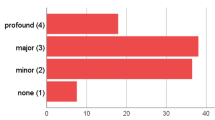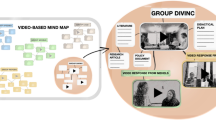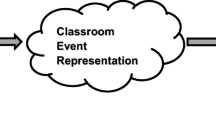Abstract
This paper seeks to identify actions that can be regarded as building elements of teachers’ classroom practice in mathematical discussion and how these actions may be combined to provide fruitful learning opportunities for students. It stands on a framework that focuses on two key elements of teaching practice: the tasks that teachers propose to students and the way teachers handle classroom communication. Tasks are appraised concerning their level of challenge. Teachers’ actions in discussions are classified as informing/suggesting, guiding, and challenging. The methodology is qualitative with data collected from video recording of the classroom. The analysis of classroom episodes dealing with rational numbers but with different agendas, such as providing students opportunities for learning about representations, concepts, connections, and procedures and for developing reasoning suggests that some degree of challenge promotes fruitful learning situations. However, such situations tend to require preparation and follow-up with guiding and even informing/suggesting actions so that the students can learn what has been set in the teacher’s agenda.







Similar content being viewed by others
Notes
This study is a secondary analysis made collaboratively by both authors on the video records and transcripts of the classes taught by the second author as a research on her own practice for a master degree carried out under the supervision of the first author.
All instances of the teacher’s actions were coded independently by one of the authors and an external researcher to find the percent of agreement.
References
Bartolini Bussi, M., & Mariotti, M. A. (2008). Semiotic mediation in the mathematics classroom. In L. English (Ed.), International research in mathematics education (2nd ed., pp. 750–787). New York: Rutledge.
Bishop, A., & Goffree, F. (1986). Classroom organization and dynamics. In B. Christiansen, A. G. Howson, & M. Otte (Eds.), Perspectives on mathematics education (pp. 309–365). Dordrecht: Reidel.
Bogdan, R., & Biklen, S. K. (1982). Qualitative research for education: An introduction to theory and methods. Boston: Allyn & Bacon.
Brendefur, J., & Frykholm, J. (2000). Promoting mathematical communication in the classroom: Two preservice teachers’ conceptions and practices. Journal of Mathematics Teacher Education, 3, 125–153.
Cengiz, N., Kline, K., & Grant, T. J. (2011). Extending students’ mathematical thinking during whole-group discussions. Journal of Mathematics Teacher Education, 14, 355–374.
Christiansen, B., & Walther, G. (1986). Task and activity. In B. Christiansen, A. Howson, & M. Otte (Eds.), Perspectives on mathematics education (pp. 243–307). Dordrecht: Reidel.
Franke, M. L., Kazemi, E., & Battey, D. (2007). Understanding teaching and classroom practice in mathematics. In F. Lester (Ed.), Second handbook of mathematics teaching and learning (pp. 225–256). Greenwich: Information Age.
NCTM. (1991). Professional standards for teaching mathematics. Reston: NCTM.
NCTM. (2014). Principles to actions: Ensuring mathematical success for all. Reston: NCTM.
Ponte, J. P. (2005). Gestão curricular em Matemática. In GTI (Ed.), O professor e o desenvolvimento curricular (pp. 11–34). Lisboa: APM.
Ponte, J. P., & Chapman, O. (2006). Mathematics teachers’ knowledge and practices. In A. Gutierrez & P. Boero (Eds.), Handbook of research on the psychology of mathematics education: Past, present and future (pp. 461–494). Roterdham: Sense.
Ponte, J. P., Mata-Pereira, J., & Quaresma, M. (2013). Ações do professor na condução de discussões matemáticas. Quadrante, 22(2), 55–81.
Potari, D., & Jaworski, B. (2002). Tackling complexity in mathematics teaching development: Using the teaching triad as a tool for reflection and analysis. Journal of Mathematics Teacher Education, 5, 351–380.
Quaresma, M. (2010). Ordenação e comparação de números racionais em diferentes representações: Uma experiência de ensino (Unpublished master’s thesis). Universidade de Lisboa, Lisbon.
Ruthven, K. (1989). An exploratory approach to advanced mathematics. Educational Studies in Mathematics, 20, 449–467.
Ruthven, K., Hofmann, R., & Mercer, N. (2011). A dialogic approach to plenary problem synthesis. In B. Ubuz (Ed.), Proceedings of the 35th Conference of the International Group for the Psychology of Mathematics Education (Vol. 4, pp. 81–88). Ankara, Turkey: PME.
Schoenfeld, A. H. (2010). How we think: A theory of goal-oriented decision making and its educational applications. New York: Rutledge.
Schoenfeld, A. H. (2014). What makes for powerful classrooms, and how can we support teachers in creating them? A story of research and practice, productively intertwined. Educational Researcher, 43(8), 404–412.
Sherin, M. G. (2002). A balancing act: Developing a discourse community in the mathematics classroom. Journal of Mathematics Teacher Education, 5, 205–233
Stein, M. K., Remillard, J., & Smith, M. (2007). How curriculum influences student learning. In F. Lester (Ed.), Second handbook of mathematics teaching and learning (pp. 319–369). Greenwich: Information Age.
Stein, M. K., Engle, R. A., Smith, M., & Hughes, E. K. (2008). Orchestrating productive mathematical discussions: Five practices for helping teachers move beyond show and tell. Mathematical Thinking and Learning, 10, 313–340.
Wood, T. (1999). Creating a context for argument in mathematics class. Journal for Research in Mathematics Education, 30(2), 171–191.
Author information
Authors and Affiliations
Corresponding author
Rights and permissions
About this article
Cite this article
da Ponte, J.P., Quaresma, M. Teachers’ professional practice conducting mathematical discussions. Educ Stud Math 93, 51–66 (2016). https://doi.org/10.1007/s10649-016-9681-z
Published:
Issue Date:
DOI: https://doi.org/10.1007/s10649-016-9681-z




